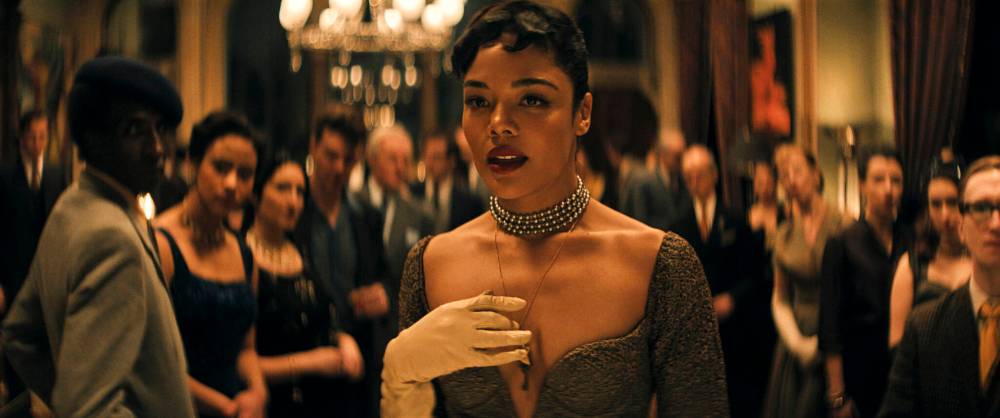Issues of race, queerness integrated in heady adaptation of Ibsen classic
Tessa Thompson brings new life to title character
Advertisement
Read this article for free:
or
Already have an account? Log in here »
To continue reading, please subscribe:
Monthly Digital Subscription
$0 for the first 4 weeks*
- Enjoy unlimited reading on winnipegfreepress.com
- Read the E-Edition, our digital replica newspaper
- Access News Break, our award-winning app
- Play interactive puzzles
*No charge for 4 weeks then price increases to the regular rate of $19.95 plus GST every four weeks. Offer available to new and qualified returning subscribers only. Cancel any time.
Monthly Digital Subscription
$4.99/week*
- Enjoy unlimited reading on winnipegfreepress.com
- Read the E-Edition, our digital replica newspaper
- Access News Break, our award-winning app
- Play interactive puzzles
*Billed as $19.95 plus GST every four weeks. Cancel any time.
To continue reading, please subscribe:
Add Free Press access to your Brandon Sun subscription for only an additional
$1 for the first 4 weeks*
*Your next subscription payment will increase by $1.00 and you will be charged $16.99 plus GST for four weeks. After four weeks, your payment will increase to $23.99 plus GST every four weeks.
Read unlimited articles for free today:
or
Already have an account? Log in here »
Stepping into a role that’s been played onstage by some of the great leading women of the past century (Ingrid Bergman, Diana Rigg, Glenda Jackson, Isabelle Huppert, Claire Bloom, Maggie Smith, Judy Davis, Cate Blanchett), Tessa Thompson is magnetic.
As the centre of Henrik Ibsen’s scandalous 1891 play Hedda Gabler, Thompson (Creed) mesmerizes, veering from manipulative monster to misunderstood martyr with a complex emotional energy that practically vibrates onscreen.
American writer-director Nia DaCosta (Candyman) transfers Ibsen’s original text to a swanky version of 1950s Britain, working with freedom and flare but also rigorous intelligence. The issues of race and queerness raised in this updated adaptation aren’t just dropped in, they are thoroughly integrated into Ibsen’s examination of social conformity and existential authenticity.

Courtesy Prime / TNS
As Hedda Gabler, Tessa Thompson is enigmatic to the very end.
The results are both gloriously theatrical, bursting with big juicy performances, and slyly cinematic, as DaCosta’s camera prowls restlessly through an opulent English mansion over the course of one fabulous, debauched, possibly deadly party.
Hedda has planned every aspect of the evening, inviting the dry, scholarly colleagues of her husband George Tesman (Death on the Nile’s Tom Bateman), as well as her own reckless, glamorous bohemian friends.
By impressing and entertaining the head of her husband’s university department, she hopes to ensure an appointment that will allow the couple to keep their heavily mortgaged house. But she has also invited her former lover, Eileen Lovberg (Tar’s Nina Hoss), George’s professional rival, who is now on the verge of publishing a revolutionary book.
“Nothing can go wrong tonight,” George warns his wife as they get dressed for the party. “And keep those guns out of sight.”
Oh, poor George. He has no idea.
The party will be marked by sexual undercurrents — and overcurrents, for that matter — by academic intrigue and rumour, by the pressing imperatives of money and power, by jealousy and regret.
All this ruction will be made even more fraught by the constant reminder of those guns, part of Hedda’s ambivalent inheritance as the illegitimate daughter of the late Gen. Gabler.
As played by Thompson, Hedda remains intriguingly enigmatic right until the film’s last frame.
At times, she seems possessed by the desire for luxury. At other times she seems to feel nothing but contempt for “this ridiculous house.”
Sometimes she seems like a victim — an intelligent, determined woman condemned by the strictures of her time to channel her ambition only through her husband.
Sometimes she seems like an agent of chaos, driven by some lurking, devouring dissatisfaction to blow things up just because, as one character puts it, she is “catastrophically bored.”
Hoss’s Eileen is similarly complicated. She has taken risks to forge a life of meaning and purpose, but she can also be self-destructive and weak. Her scenes with Hedda are charged with desire and a sense of doom — even when guns aren’t involved.
The film occasionally feels overstuffed with people being dragged into this room or that for dramatic showdowns, at a pace that sometimes falters, sometimes speeds.
Still, even when Hedda feels like too much, all these big emotions are swept up and held together by the centrifugal force of Thompson’s charisma.
alison.gillmor@freepress.mb.ca

Studying at the University of Winnipeg and later Toronto’s York University, Alison Gillmor planned to become an art historian. She ended up catching the journalism bug when she started as visual arts reviewer at the Winnipeg Free Press in 1992.
Our newsroom depends on a growing audience of readers to power our journalism. If you are not a paid reader, please consider becoming a subscriber.
Our newsroom depends on its audience of readers to power our journalism. Thank you for your support.
History
Updated on Friday, October 31, 2025 7:13 AM CDT: Corrects headline


